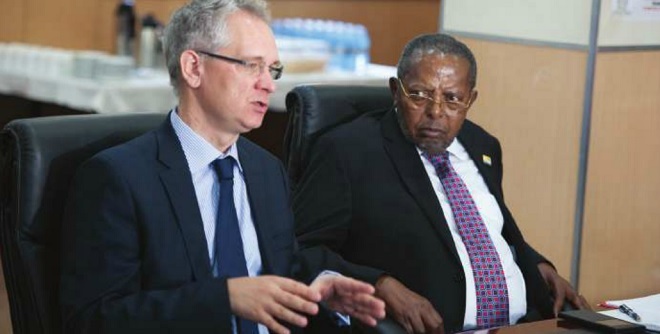
The economy isn’t in such a bad shape as earlier thought, the International Monetary Fund (IMF) has said in its latest assessment.
Speaking at the conclusion of a two-week’s 7th review of Uganda’s economic programme under the Policy Support Instrument (PSI), Axel Schimmelpfennig, the IMF Mission chief, said the country’s prospects look positive as Growth Domestic Product (GDP) is expected to grow at 5% this fiscal year and 5.5% in 2017/2018, up from 4.8% in 2015/2016.
PSI is an instrument of the IMF that helps countries to design effective economic programmes that, once approved by the IMF’s executive board, signal to donors, multilateral development banks, and markets that the Fund has endorsed a country’s policies. This projected growth illustrates a rebound in the economy, having grown with a similar percentage in the FY 2014/15 and 5.7% in the FY 2013/14.
“Uganda’s economy performed well in a complex environment,” Schimmelpfennig said on Oct.26. “The February 2016 election muted the global growth, and regional developments weighed on sentiments and growth declined. More recently, high frequency indicators suggest an improvement and growth is projected at a solid 5% this fiscal year supported by scaling up of infrastructure spending.”
Schimmelpfennig said BoU has successfully steered core inflation towards its target of 5% and increased its international reserves by $160 million. Since June, inflation has fallen from 5.9% to 4.2% in September, according to the latest data from the Uganda Bureau of Statistics, a development that prompted the Central bank to lower its key rate from 14% in August to 13% in October. However, while the government’s revenue collections increased as a share of GDP, they fell short of programme expectations. Similarly, current government spending was higher than anticipated.
“Taken together, the overall deficit target was missed by 0.4% of GDP, and the government partly relied on BoU advances for its financing needs. The execution of externally financed projected lagged behind,” Schimmelpfennig added.
While Finance Minister Matia Kasaija agreed with the assessment, he urged the World Bank to lift the suspension of loan disbursements to the country saying the move had caused a stalemate in the implementation of development projects. Nearly two months ago, the World Bank suspended funding to Uganda amounting to close to $1.5bn citing low absorption and failure to enforce social protection safeguards in the projects.
At the same meeting, BoU Governor Emmanuel Tumusiime-Mutebile dismissed as “rubbish” rumors regarding the safety of the banking sector, saying it is sound and profitable save for “one or two institutions that need to be watched.”
Going forward, Schimmelpfennig said the government needs to increase the tax to GDP ratio by 0.5% and to prioritise social and development spending such as education and health within a tight envelope.
****
editor@independent.co.ug
 The Independent Uganda: You get the Truth we Pay the Price
The Independent Uganda: You get the Truth we Pay the Price



